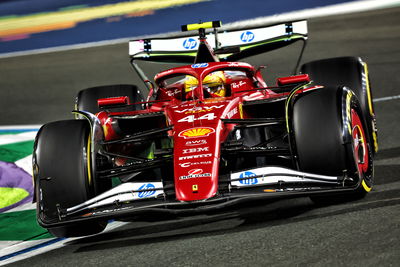FIA: Hamilton, Liuzzi cases totally different.
Having controversially dismissed McLaren-Mercedes' right to appeal the penalty meted out to on-the-road Belgian Grand Prix winner Lewis Hamilton yesterday, the FIA has responded to criticism by explaining that the circumstances were entirely different to those in what was on the surface a similar case last year.
Following the 2007 Japanese Grand Prix at Fuji, Scuderia Toro Rosso's Vitantonio Liuzzi was penalised 25 seconds for having overtaken the Spyker of Adrian Sutil under waved yellow flags in the late stages of the race.

Having controversially dismissed McLaren-Mercedes' right to appeal the penalty meted out to on-the-road Belgian Grand Prix winner Lewis Hamilton yesterday, the FIA has responded to criticism by explaining that the circumstances were entirely different to those in what was on the surface a similar case last year.
Following the 2007 Japanese Grand Prix at Fuji, Scuderia Toro Rosso's Vitantonio Liuzzi was penalised 25 seconds for having overtaken the Spyker of Adrian Sutil under waved yellow flags in the late stages of the race.
Whilst the Ferrari-powered squad was permitted to appeal the punishment - denying it at the time what was its first point of the season - McLaren was not afforded the same grace, sending Formula 1's conspiracy theorists into overdrive once more and adding further fuel to the fire for those who believe the FIA is biased towards Maranello.
Hamilton was dealt the retrospective equivalent of a drive-through penalty at Spa-Francorchamps for having been deemed by race stewards to have gained an unfair advantage by cutting the Bus-Stop chicane on lap 42 of 44 in his battle with Ferrari rival Kimi Raikkonen, even though the British ace relinquished the position again immediately afterwards under instruction from his team.
The sport's governing body ruled in Paris on Tuesday that 'drive-through penalties are 'not susceptible to appeal' and that the fact that the punishment took the form of a time addition rather than a drive-through - as there was not enough time left in the race to serve it - did not 'change the nature of the penalty' [see separate story - click here].
The FIA similarly rejected McLaren's assertion that the precedent of Liuzzi's penalty was relevant because 'none of the parties concerned had raised the inadmissibility of the appeal in that case.
'Consequently that judgment does not present itself as settled law with respect to this question and does not bind the court in the present case.'
McLaren was ordered to pay court costs.
The only successful appeal in F1 history came when Ferrari's Eddie Irvine and Michael Schumacher were disqualified from first and second places over a bargeboard infringement in the 1999 Malaysian Grand Prix, but subsequently re-in stated.










